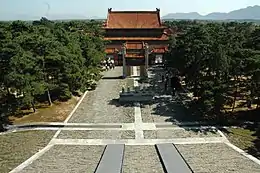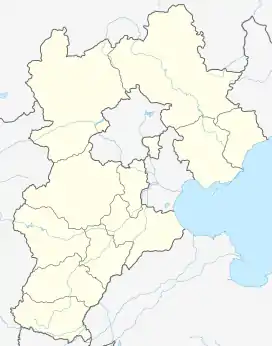Malanyu
Malanyu (simplified Chinese: 马兰峪镇; traditional Chinese: 馬蘭峪鎮; pinyin: Mǎlányù Zhèn) is a town approximately 30 kilometres (19 mi) west of the city of Zunhua, Hebei, which administrates the town, and about 120 kilometers from the Forbidden City in Beijing. It hosts the Eastern Qing Tombs, a site that is the final resting place of some of the Qing emperors and empresses. The 78-square-kilometer site, known more widely as the Eastern Qing Tombs, is the burial place for 5 emperors, 15 empresses and 136 imperial concubines within 15 tombs, including the Shunzhi Emperor (1638–1661), the Kangxi Emperor (1654–1722), the Qianlong Emperor (1711–1799), and Empress Dowager Cixi (1835–1908).
Malanyu
马兰峪镇 | |
|---|---|
 | |
 Malanyu Location in Hebei | |
| Coordinates (Malanyu town government): 40°11′24″N 117°42′00″E | |
| Country | People's Republic of China |
| Province | Hebei |
| Prefecture-level city | Tangshan |
| County-level City | Zunhua |
| Area | |
| • Total | 50.8 km2 (19.6 sq mi) |
| Population (2017) | 25,000 |
| • Density | 492.13/km2 (1,274.6/sq mi) |
| Time zone | UTC+8 (China Standard) |
History
Qing Dynasty
While on a hunting trip, Emperor Shunzhi of the Qing Dynasty, allegedly awestruck by the area's beauty, declared that he wished to be buried there.[2] His successor, Emperor Kangxi, began the construction of tombs on the site, now known as the Eastern Qing Tombs, in 1663. Emperor Kangxi, along with a team of both Manchu and Han planners, planned out the site, which includes a number of pathways, towers, temples, pavilions, arches, and sculptures.[2] Emperor Kangxi, after his reign, was buried at the site with his concubines.[2]
1928 Robbery
In 1928, the Eastern Qing Tombs were robbed in a large-scale looting orchestrated by local warlord Sun Dianying, and his subordinate, Tan Wenjiang.[2] Despite widespread outrage at the looting, even by top Chinese officials, Sun faced no reprocussions.[2]
Administrative divisions
Malanyu is divided into 1 neighborhood committee, 25 administrative villages, 30 natural villages [zh].[1]
Demographics
Malanyu is one of the two minority-majority towns in Zunhua,[3] with Han Chinese constituting only 13% of the town's population.[1] While most of the people in Malanyu are ethnically Manchu, there are also significant Mongol and Hui populations.[1]
References
- 遵化市马兰峪镇_行政区划网(区划地名网) www.xzqh.org (in Chinese). XZQH.org. Retrieved 2020-04-24.
- "The Qing East Imperial Tombs". www.china.org.cn. Retrieved 2020-04-24.
- 人口民族-唐山市人民政府 (in Chinese). Tangshan People's Government. 2019-07-28. Archived from the original on 2019-07-28. Retrieved 2020-04-24.
